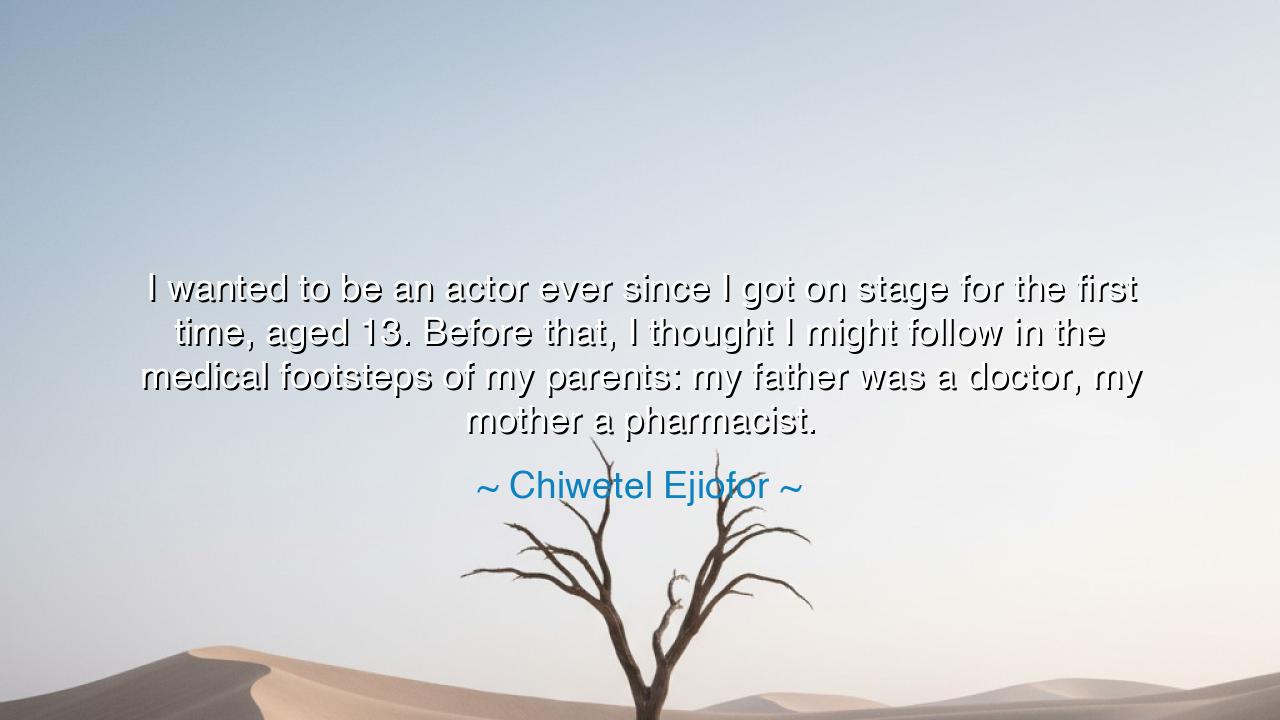
I wanted to be an actor ever since I got on stage for the first
I wanted to be an actor ever since I got on stage for the first time, aged 13. Before that, I thought I might follow in the medical footsteps of my parents: my father was a doctor, my mother a pharmacist.






The words of Chiwetel Ejiofor are filled with the weight of destiny and the turning of paths: “I wanted to be an actor ever since I got on stage for the first time, aged 13. Before that, I thought I might follow in the medical footsteps of my parents: my father was a doctor, my mother a pharmacist.” In this confession lies the eternal struggle of humankind: the pull between inheritance and calling, between the path laid down by family and the fire kindled in the soul. His words remind us that though we may be born among certain traditions, each heart must still discover the craft to which it truly belongs.
The stage at thirteen became for Ejiofor a moment of awakening, like the ancients who spoke of epiphanies granted by the gods. Just as Pythagoras, hearing the hammer strike the anvil, discerned the mathematics of music, so too did Ejiofor, stepping onto the stage, discern his destiny. For what is an actor, if not one who lives many lives to reveal the truth of the one life we all share? That stage, in its simplicity, became his altar of discovery. He knew then that his life would not be in the quiet medical footsteps of his parents, noble though they were, but in the burning fire of performance.
Yet his words honor his family’s path. A doctor heals the body, a pharmacist prepares the remedies of life. To follow them would have been no shame, for medicine is one of humanity’s oldest and most sacred callings. From Hippocrates of Greece to Avicenna of Persia, healers have been guardians of life against death. Ejiofor’s respect for his father and mother shows us the humility of one who knows that greatness takes many forms. He did not cast aside their legacy; he simply discovered that his own way of healing would be different.
For the actor, too, is a kind of physician—not of the body, but of the soul. Where the doctor stitches wounds of flesh, the actor reveals wounds of the heart, bringing to light what is hidden and offering audiences a mirror in which they may find healing. History remembers how in Athens, the tragedies of Sophocles and Euripides were not mere entertainments, but medicine for the spirit of the polis, teaching citizens how to grieve, how to endure, how to understand the divine and the human. In choosing the stage, Ejiofor embraced not a lesser calling, but one equally ancient and sacred.
Consider also the tale of Anton Chekhov, who was himself both doctor and playwright. He once said, “Medicine is my lawful wife, and literature is my mistress.” He healed bodies by day, and souls by night through the stories he brought forth. Chekhov shows us that the boundary between medicine and art is not absolute—they are both ways of serving humanity. In Ejiofor’s life, we see a similar truth: he did not choose against medicine, but for another form of it—the medicine of story.
The lesson is clear: each person must find their true calling, even if it diverges from the path of their ancestors. To honor your family is not always to imitate them; it is to live fully into your own gift, so that their labor of raising you is not in vain. For what greater honor can a child give to their parents than to live with passion, to shine with the light of their own destiny?
And so, children of the future, take this wisdom to heart: respect the path of those who came before you, but do not be bound to it. Listen for the moment of awakening, whether it comes on a stage, in a workshop, at a desk, or beneath the open sky. When it comes, do not turn away. Let your parents’ footsteps inspire you, but let your own feet carry you to the destiny that calls your name. For only then will you live not as an echo, but as a voice.
Thus, Chiwetel Ejiofor’s words become a testament to the balance of reverence and courage: reverence for the noble callings of family, and courage to follow the fire within. To heal, to perform, to create—each is a sacred way. But your way, once found, must be embraced, for in that lies the fullness of your life.






AAdministratorAdministrator
Welcome, honored guests. Please leave a comment, we will respond soon